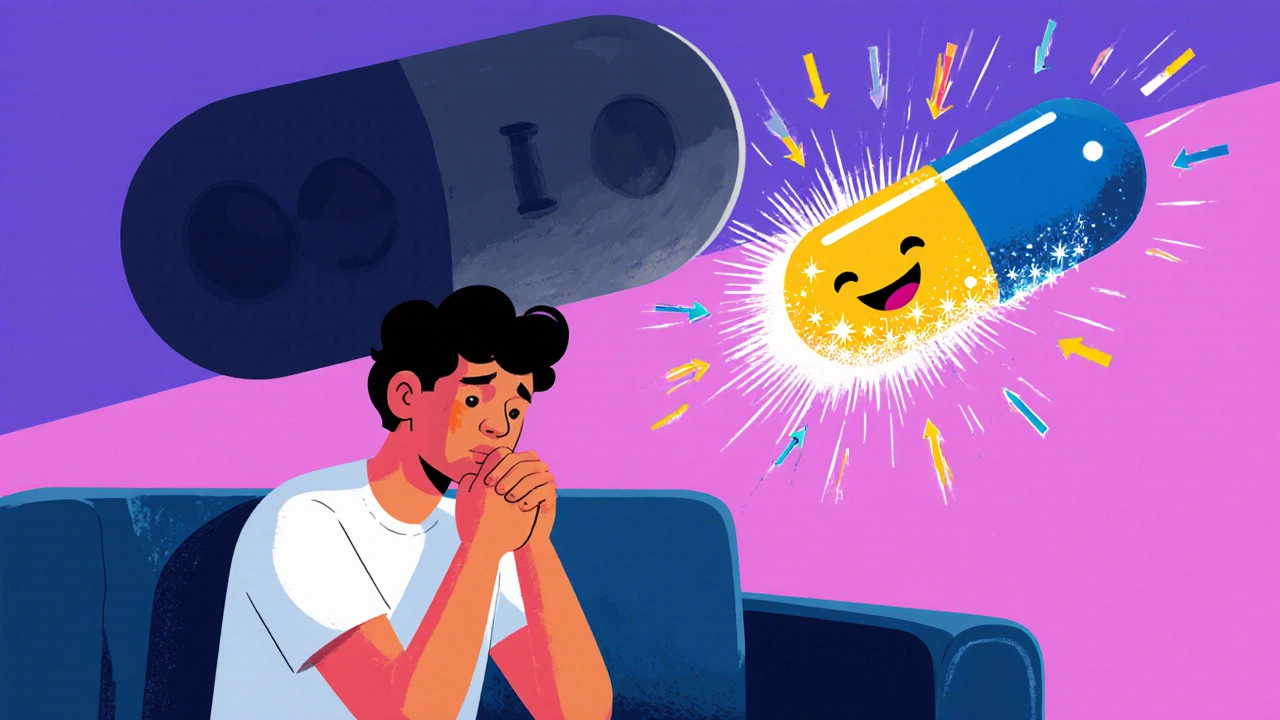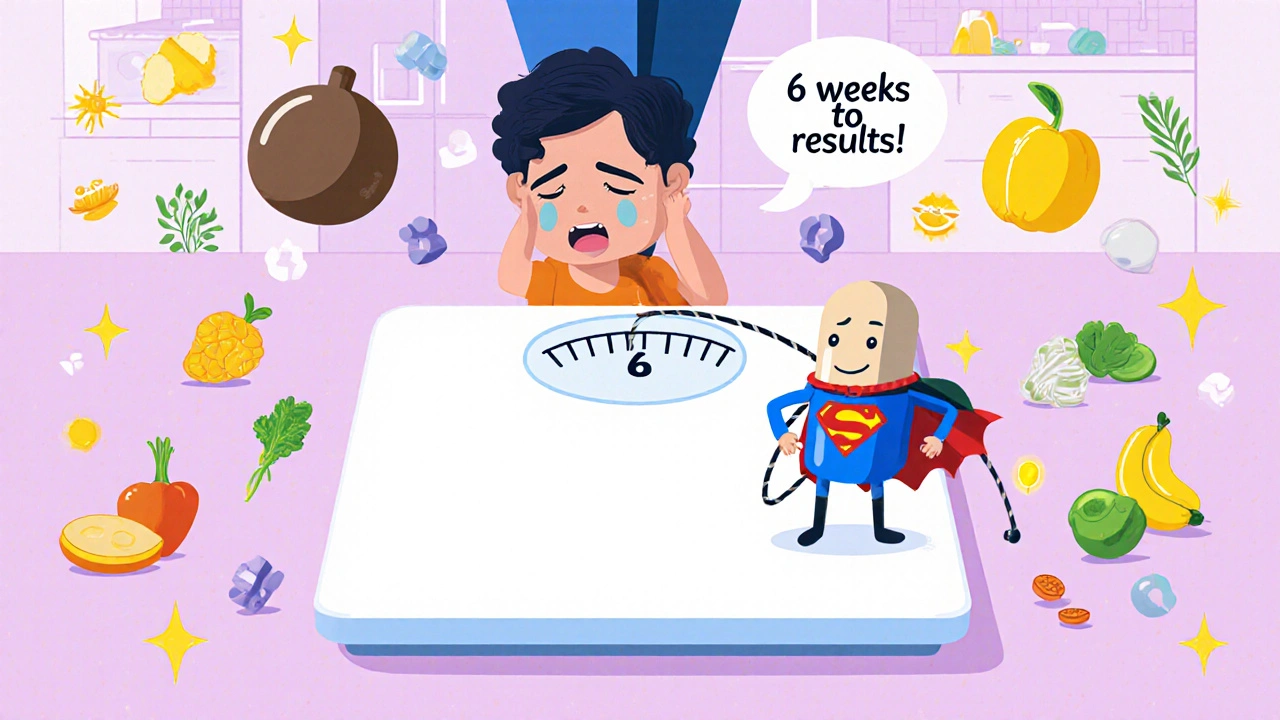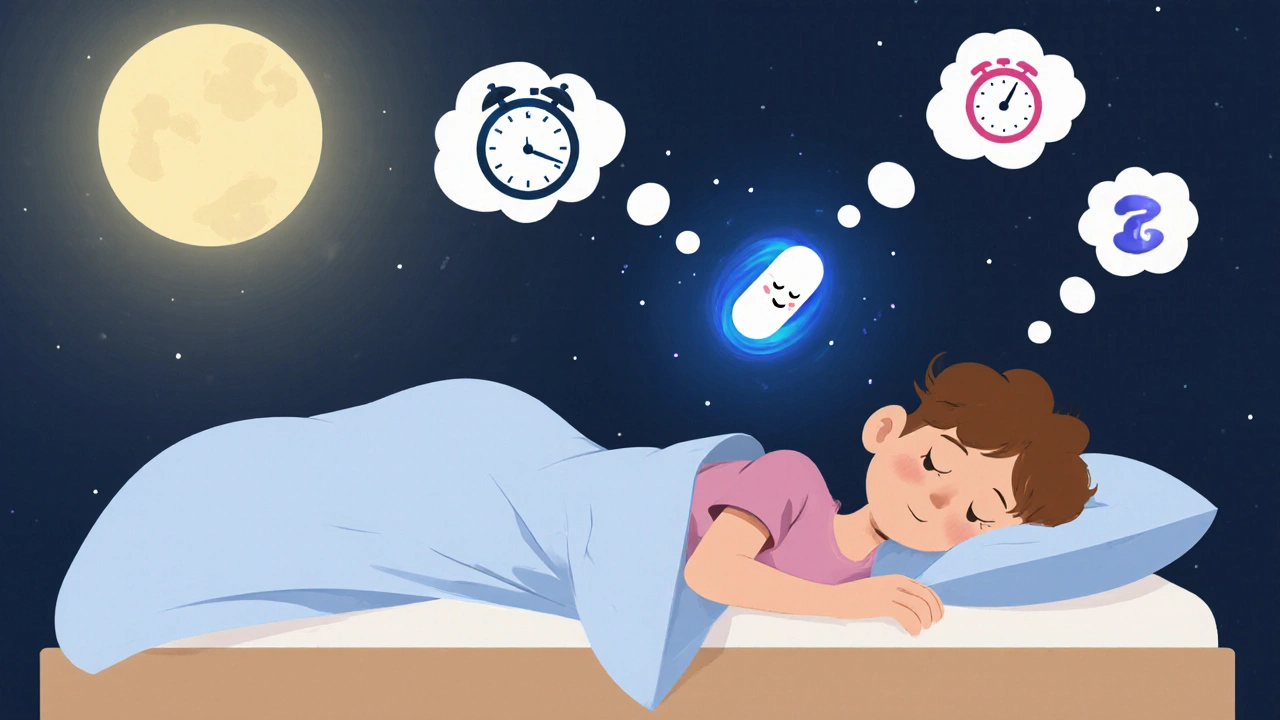Antidepressant Side Effect Augmentation Guide
Identify Your Primary Side Effect
This tool helps match common antidepressant side effects with evidence-based augmentation options. Always discuss with your doctor before making changes to your medication.
Recommended Augmentation Strategy
Dosing Information
Key Considerations
Important Warnings
Many people start antidepressants hoping for relief from depression - but instead, they get sleepless nights, low libido, weight gain, or brain fog. These side effects aren’t just annoying. They’re why nearly half of all people stop taking their medication within six months. The good news? You don’t have to choose between feeling better mentally and feeling worse physically. There are proven ways to fix these problems without ditching your antidepressant. This isn’t about switching drugs or upping the dose. It’s about adding something small - a second medication - to calm down the side effects while keeping the benefits. And it works.
Why Side Effects Make People Quit Antidepressants
Antidepressants like SSRIs and SNRIs are effective for depression, but they come with a long list of possible side effects. About 30% to 70% of people on these drugs report sexual problems - reduced desire, trouble getting aroused, or delayed orgasm. Up to 30% struggle with insomnia or restless sleep. Nearly half gain weight over time. And many feel emotionally numb, like they’re watching life through fogged glass.
These aren’t rare side effects. They’re common. And they’re not minor. When you’re already struggling with depression, losing your sex life or gaining 15 pounds can feel like a betrayal. That’s why, according to studies, side effects are the #1 reason people stop taking their meds - even when the depression is improving.
Most doctors tell patients to wait it out. But waiting doesn’t always help. And waiting too long means you might quit altogether. That’s where augmentation comes in.
What Is Augmentation? (And How It’s Different From Switching)
Augmentation means adding a second medication - not to replace the first, but to fix a specific problem it’s causing. Think of it like adding a buffer to a rough road. You’re still driving the same car, but now the ride is smoother.
This is not the same as switching antidepressants. Switching means stopping one drug and starting another. It’s risky. You lose the progress you’ve made, and the new drug might bring its own side effects. Augmentation keeps what’s working and adds just enough to fix what’s broken.
It’s also not about treating depression that’s not responding. That’s treatment-resistant depression augmentation. This is about tolerability - making the drug you’re already on easier to live with.
Fixing Insomnia With Low-Dose Trazodone
If your SSRI is keeping you awake, trazodone at 25 to 50 mg at night is one of the most reliable fixes. It’s not a strong antidepressant at this dose - it’s a sleep aid with a side benefit of calming serotonin overactivity.
Studies show it improves sleep quality by 65% in people on SSRIs, compared to just 35% with placebo. Patients report falling asleep faster, staying asleep longer, and waking up feeling less groggy. One user on Reddit wrote: “Prozac was wrecking my sleep. Added 25 mg trazodone at night. Now I sleep through the night. No more 3 a.m. panic.”
It’s cheap, generic, and rarely causes dependency. The main downside? Morning drowsiness. But at low doses, that’s uncommon. Most people adjust within a few days. Doctors usually start at 25 mg and go up to 50 mg if needed. Don’t take it during the day - it’s meant for bedtime.
Restoring Sex Drive With Bupropion
Sexual side effects are the most dreaded complaint. Many patients say they’d rather feel depressed than lose their sex life. Bupropion (Wellbutrin) is the most studied and most used fix for this.
How it works: SSRIs flood your brain with serotonin, which shuts down dopamine and norepinephrine - the chemicals behind desire and arousal. Bupropion does the opposite. It boosts dopamine and norepinephrine. That counteracts the SSRI’s effect.
Studies show 50% to 60% of people on bupropion augmentation report improved sexual function. In one trial, 60% of users saw improvement compared to only 20% on placebo. It’s used in 65% of all cases where sexual side effects are targeted.
Dose matters: 75 to 150 mg daily is typical. Start low. Don’t exceed 150 mg if you’re also on an SSRI - higher doses raise seizure risk. Avoid it if you have a seizure history, an eating disorder, or severe anxiety. Some people feel jittery or wired at first. That usually fades.
On PatientsLikeMe, one user wrote: “After 6 months of no libido on Lexapro, I added 150 mg Wellbutrin. My sex drive came back. Not 100%, but enough to feel human again.”

Managing Weight Gain With Topiramate
Weight gain is a silent killer of treatment adherence. Antidepressants like paroxetine, mirtazapine, and sertraline can cause slow, steady weight gain - 2 to 5 pounds per month. Over a year, that’s 20 to 60 pounds.
Topiramate (Topamax), originally an anti-seizure and migraine drug, has shown strong weight-loss effects in people on antidepressants. Studies show patients lose 2.5 to 4.5 kg (5.5 to 10 lbs) more than those on placebo over 12 weeks.
Dosing starts at 25 mg daily, often increased to 50-100 mg. It’s not a quick fix. It takes 6-8 weeks to see results. Side effects include brain fog, tingling in hands and feet, and trouble finding words. One user on Drugs.com said: “I lost 12 pounds, but felt like I was thinking through cotton. Not worth it.”
It’s not for everyone. But for those who struggle with weight and can tolerate mild cognitive side effects, it’s one of the few tools that actually reverses the trend.
When Antipsychotics Like Aripiprazole Are Used - And When They’re Not
Aripiprazole (Abilify) is often added to antidepressants for residual depression - not just side effects. But it’s also used when patients have agitation, irritability, or emotional numbness.
It works by balancing dopamine. At low doses (2-5 mg), it can lift mood and sharpen thinking. But it comes with serious trade-offs. In clinical trials, 7-12% of users developed akathisia - that unbearable inner restlessness. One patient described it as “crawling out of my skin.”
Weight gain is another risk. People on aripiprazole gain 3.5-4.5 kg in just 6 weeks. Blood sugar and cholesterol levels can rise too.
That’s why it’s not a first-line fix for side effects. It’s reserved for cases where other options failed - and only when the benefits clearly outweigh the risks. The FDA approved a lower-dose version (Abilify MyCite) in 2022, which reduces akathisia by 30%. Still, most doctors avoid it unless necessary.
What Doesn’t Work (And Why)
Not every “fix” is backed by science. Many patients try herbal supplements, acupuncture, or over-the-counter sleep aids. Some work briefly. None have consistent, reliable results in clinical trials.
Buspirone (Buspar) is sometimes used for sexual side effects. It helps a little - about 40% improvement - but not as much as bupropion. Mirtazapine can help sleep, but it causes weight gain. That defeats the purpose if you’re already gaining weight.
And don’t try to “dose down” your antidepressant to reduce side effects. Lowering the dose often makes depression worse. You end up stuck between two bad choices. Augmentation gives you the best of both: full antidepressant effect, plus relief from the side effects.

How to Get Started - Step by Step
Augmentation isn’t something you do on your own. It requires a doctor who knows the options. Here’s how to approach it:
- Identify the main side effect. Is it sleep? Sex? Weight? Brain fog? Write it down.
- Track how bad it is. Rate it on a scale of 1 to 10. Does it stop you from working? Having relationships? Sleeping? That helps your doctor understand urgency.
- Ask for augmentation - specifically. Say: “I’m doing well on my antidepressant, but the [side effect] is unbearable. Are there any medications I can add to fix that without changing my current one?”
- Start low, go slow. Most augmentation drugs work best at low doses. Give it 2-4 weeks to see if it helps.
- Monitor closely. Keep a journal. Note changes in mood, sleep, energy, and side effects. Bring it to your next appointment.
Don’t be afraid to ask questions. If your doctor says, “Just wait,” or “That’s normal,” push back. You deserve to feel better - not just less depressed, but truly well.
What the Experts Say
Dr. Stephen Stahl, a leading psychopharmacologist, says: “The best augmentation choice depends on what’s broken - not just what’s depressed.” If you’re tired and have low sex drive, bupropion makes sense. If you’re awake all night, trazodone is the go-to.
But Dr. Charles Nemeroff warns: “Adding a second drug doubles the risk of new side effects.” That’s why you need to be smart about it. Only add what’s necessary. And always weigh the risk of the fix against the risk of quitting your antidepressant entirely.
And here’s the bottom line: Augmentation isn’t a last resort. It’s a smart, evidence-based tool. In systems like Kaiser Permanente, using standardized augmentation protocols cut antidepressant discontinuation due to side effects by 22%.
The Future: Personalized Augmentation
Now, doctors are starting to use genetic tests like Genomind PGx to predict how you’ll respond to certain drugs. If your genes show you metabolize SSRIs slowly, you’re more likely to have side effects. That tells your doctor: start with a lower dose - or consider augmentation from day one.
Research is also looking at glutamate modulators like d-cycloserine for cognitive side effects. Early results show promise in improving memory and focus without worsening depression.
But the real future isn’t more drugs. It’s better antidepressants - ones that don’t cause these problems in the first place. Until then, augmentation is your best tool.
Can I take trazodone with my SSRI for sleep?
Yes, low-dose trazodone (25-50 mg at night) is commonly and safely combined with SSRIs to treat insomnia caused by these medications. It works by blocking serotonin receptors that interfere with sleep, without reducing the antidepressant effect. Studies show it improves sleep quality by 65% in these cases. Always start low and avoid taking it during the day.
Will bupropion make my anxiety worse?
It can. Bupropion stimulates dopamine and norepinephrine, which helps sexual side effects and fatigue - but in about 15-20% of people, it increases anxiety, jitteriness, or irritability. If you have panic disorder or severe anxiety, your doctor may avoid it or start with a very low dose (75 mg). Monitor closely for the first two weeks.
Is topiramate safe for long-term use to control weight gain?
Topiramate is approved for long-term use in epilepsy and migraines, and studies support its use for weight management in depression for up to a year. However, long-term cognitive side effects like brain fog and memory issues can persist. Regular blood tests and cognitive checks are recommended. It’s not a permanent solution - it’s a tool to help you regain control while you work on lifestyle changes.
Why isn’t aripiprazole used more often for side effects?
Because it causes serious side effects like akathisia (inner restlessness), weight gain, and metabolic changes. While it helps with mood and emotional blunting, its risks outweigh benefits for most side effect issues. It’s reserved for cases where other options have failed and the patient’s depression is still severe. The newer low-dose version (2-3 mg) is safer, but still not first-line for side effects alone.
How long does it take for augmentation to work?
It varies. Trazodone for sleep often works in 2-3 days. Bupropion for sexual side effects takes 2-4 weeks. Topiramate for weight loss takes 6-8 weeks. Most side effect fixes require patience. Don’t quit after one week. Give it time - but if you feel worse after 4 weeks, talk to your doctor. It’s not working for you.
Can I combine multiple augmentation agents?
It’s possible - but risky. Adding more than one augmentation increases side effect risk, drug interactions, and complexity. For example, combining trazodone and bupropion is sometimes done for both sleep and sexual side effects. But it requires close monitoring. Most doctors avoid this unless absolutely necessary. The goal is always to use the fewest drugs possible to get the best result.
If you’re struggling with antidepressant side effects, you’re not alone - and you’re not stuck. There are real, proven ways to fix this without giving up on treatment. Talk to your doctor. Ask about augmentation. You deserve to feel better - in every way.


So trazodone for sleep and bupropion for sex drive... sounds like we’re just patching a broken car with duct tape and hope. But hey, if it gets me through the night and lets me touch my partner without feeling like a zombie, I’ll take it. 🤷♂️
i tried topiramate for weight gain... lost 10lbs but forgot my kid’s birthday. not worth it. 🥲
The fact that you need to augment an SSRI with another psychotropic just to make it tolerable speaks volumes about the current state of psychiatric pharmacology. It’s not treatment-it’s pharmacological juggling. The real solution is better drug design, not stacking benzodiazepine-adjacent compounds like some kind of pharmaceutical IKEA furniture.
Americans are so weak. In my country, we just take it like men. No trazodone. No bupropion. No ‘brain fog.’ You suffer, you grow. This whole ‘augmentation’ thing is just another way the medical-industrial complex keeps you hooked on pills.
The fundamental flaw in this entire paradigm lies in the ontological reductionism of depression to a monoamine deficit. Augmentation strategies are symptomatic palliatives that ignore the socio-structural etiologies of affective disorders. One cannot pharmacologically compensate for alienation under late capitalism.
Bupropion DA/NE reuptake inhibition effectively counterbalances SSRI-induced 5-HT hyperactivity in the ventral tegmental pathway. Clinical efficacy is well-documented in RCTs with NNT of 2.3 for sexual function improvement. Just watch the seizure threshold if you're on >150mg with SSRIs
I added trazodone and now I’m sleeping but I cry at commercials. Is this better? I don’t know. I just know I’m not dead. 😔
I tried aripiprazole. Felt like my bones were vibrating. Also gained 8lbs in 3 weeks. Now I’m back on just fluoxetine and I’m fine. Sometimes the fix is worse than the disease. 🙃
You people are so desperate for quick fixes you’ll swallow anything. Topiramate gives you brain fog? Good. Maybe then you’ll stop scrolling TikTok and actually talk to a therapist. Pills aren’t therapy. They’re crutches.
Just wanted to say THANK YOU for this post 💙 I was about to quit my SSRI because of the weight gain and low libido… then I found this. Started bupropion 75mg two weeks ago and I’ve had my first real kiss in 18 months. I’m not fixed, but I’m feeling human again. 🙏❤️
I’ve been on sertraline for 4 years and honestly, the weight gain was crushing me. I tried everything-exercise, diet, fasting, keto, intermittent fasting, juicing, acupuncture, even hypnosis. Nothing worked. Then my psychiatrist suggested topiramate. It took 6 weeks but I lost 14 pounds. Yes, I get word-finding issues sometimes, like my brain is underwater, and I forget why I walked into a room. But I can fit into my jeans again and look in the mirror without wanting to cry. That’s worth a little fog. Also, I started journaling to help with the brain fog and it’s been surprisingly helpful. Don’t give up. You’re not broken. You’re just on the wrong version of the software and augmentation is the patch.
In India we don’t do this augmentation thing. We just take ashwagandha and do yoga. Also, we don’t have 10 different antidepressants. We have one. And we’re fine. 🙏🧘♂️